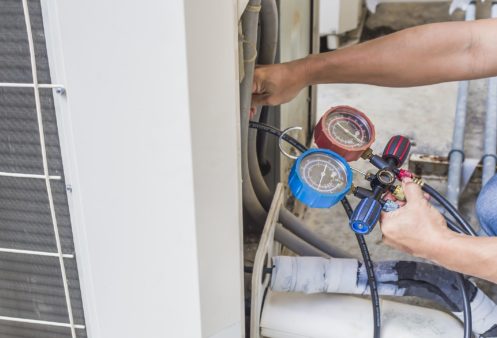Although new freon has been banned because of its negative effect on the ozone layer, recycled freon is still used in existing air conditioners as a refrigerant. Most air conditioning units have a lifespan of 10-15 years, so until freon is completely phased out, it’s helpful to know when your unit is low and how to find a leak if applicable.
In this article, we’ll cover exactly how to know when your unit is low on freon and what signs indicate a freon leak. We’ll also leave you with some pertinent information on the freon phaseout too.
What is Freon?
Freon is a chemical compound that acts as a refrigerant in most air conditioning systems. Freons are hydrochlorofluorocarbons that are colorless, odorless, nonflammable, and noncorrosive. These characteristics make it the ideal substance to aid in cooling when using an AC system.
In the 1970s, it was found that freon and other chemical refrigerants were partially responsible for the depletion of the ozone layer, the part of our atmosphere that protects us from UV rays.
How to Know When Freon is Low?
As long as there aren’t any leaks in your air conditioner, the freon in your AC unit should, theoretically, last indefinitely. This is due to the fact that the unit is hermetically sealed, which simply means the seal is airtight.
If a part is damaged within your AC unit, it has likely led to a refrigerant leak and this means you’ll need to call in a professional to repair your system.
Do you Have a Freon Leak?
If you notice any of the following issues, it likely means a leak has caused the Freon in your unit to drop or be completely emptied:
- Higher electric bills. If your AC unit is working overtime trying to keep your home cool, it’s going to reflect on your electrical bills each month.
- Blowing hot air instead of cool. If your unit is essentially doing the opposite of its job, that likely means there isn’t enough refrigerant left in your unit to adequately cool off the rooms in your home.
- Condensation forms on the external parts of the unit. Because the temperatures aren’t blowing correctly, humidity isn’t regulated and this causes condensation to form on the surface of your air conditioner.
- Frozen coils. Improper airflow, mixed with low refrigerant, can cause frozen coils due to frost buildup.
- Strange noises in the refrigerant lines. Usually, a strange noise anywhere indicates there’s an issue with that particular part of a machine.
The Freon Phaseout
In 2010, the U.S. Environmental Protection Agency (EPA) banned further production of freon and other ozone-depleting chemicals. This ban is part of a long-term phaseout on AC refrigerants that are deemed harmful to the environment.
The year 2015 saw the ban widened to cover the further restriction of production and imports of these chemicals. In 2020, it was decided that from then until 2030, only recycled freon and other chemicals could be used in servicing those machines that need to use it. In 2030, the ban will take full effect.








